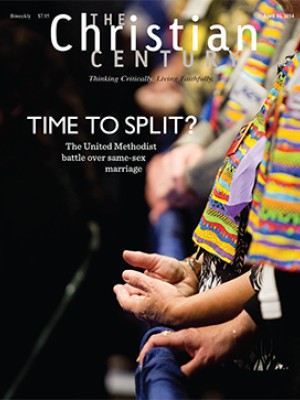Sunday, April 20, 2014 (Easter Sunday): Psalm 118:1-2, 14-24; Colossians 3:1-4
You have died, and your life is hidden with Christ in God.” I have no idea what this means. After reading this Colossians passage over and over, studying the Greek, and reviewing commentaries, I still don’t.
I believe, however, that this is like “the peace of God, which passes all understanding” in Philippians or “I came that they may have life, and have it abundantly” in John. It’s one of those distilled, cryptic passages that draw us into so much more than we can imagine. We never exhaust the meaning or the riches of such verses. Instead, they expand our capacity to wonder and give praise. They are invitations into God’s mystery.
Easter services are often pretty scripted, but Psalm 118 reminds us that Easter should be startling, mysterious: “The stone that the builders rejected has become the chief cornerstone.” The experts are clueless; normal standards are askew. Speaking elsewhere of death and resurrection, Paul declares, “Behold! I tell you a mystery.” Mysterion appears in Colossians several times, too. “You have died, and your life is hidden with Christ in God” strikes me as a beautiful, inviting mysterion.
Read our latest issue or browse back issues.
My mother, a United Methodist minister, died from Alzheimer’s disease. She wore not the white alb that she’d worn on many Easters but rather a blue hospital gown. When she was dying, our family gathered for the vigil. We didn’t know what to do, so we decided to read psalms.
I remember wondering which psalms we should read. Psalm 118 might have been a terrific choice. It celebrates God’s victory over death, calling us all to celebrate the steadfast love of the Lord and to rejoice in the day the Lord has made. But maybe she needed a psalm of lament, such as Psalm 22. “My tongue clings to my jaws”—how often had we moistened her parched lips with a sponge? Or a psalm of confession, since she knew she depended on God’s mercy.
We decided to read through all the psalms. We trusted that God’s Spirit would be at work as needed and that the fullness of my mother’s life with God—joy, lament, confession, and all—had not been defeated by tangles and plaques in her brain. Her life was hidden with Christ, hidden to us but still fully with Christ. And when “Christ who is [her] life is revealed, then [she] also will be revealed with him in glory.”
I think of friends and parishioners who are chronically lost or desperate, or who make the wrong choice time after time, despite the best efforts of others—the ones who the rest of us are ready to give up on. We see their lives quite plainly—there is nothing hidden or mysterious about their failure to enjoy the abundant life of Jesus. We have given suggestion after suggestion. Perhaps we have offered money or space in our homes. We grow disappointed, partly because we feel helpless, even betrayed. We are frustrated because there are some situations that are beyond our efforts, so we cut our losses. We make peace with what is—and we hope that this “peace” does not upset our own enjoyment of the peace which passes all understanding. In a way, these people have died to us.
But what if their lives really are hidden with Christ in God? What if our Lord sees them not as hapless ne’er-do-wells but as children of glory, just like us? In the Greek, the your is plural, and life is singular—we share a common life, and this life together is hidden with Christ in God. When Christ is revealed, what will he reveal? That we, who appear to be alive, desperately need resurrection?
At a Quaker service, I heard about a prisoner. Out of the mysterious silence a young lawyer spoke, sharing with the assembly the story of his recent visit with this man. The lawyer was known among the prison staff as a spiritual person, so a corrections officer asked him to try to get through to this distressed perpetual convict. He recounted that he simply sat with the prisoner and told him that he believed with all his heart that God already dwelled in this prisoner’s heart. That was all—no sermon, no extensive prayers. The prisoner began to weep.
The lawyer did not cite Colossians 3, but he understood that the prisoner did not see that his life was indeed in Christ. Perhaps it was so deeply hidden beneath all kinds of mistakes, crimes, and sins that few could see it. The lawyer revealed a mysterion, and the prisoner was overcome by a glimpse of it.
So many lives are so deeply hidden with Christ in God. The Greek word for hidden is crypto—hidden, concealed, secret, or not noticed. Not noticed. Not noticed by others, perhaps not noticed even by themselves. We who are busily preparing for Easter—this mysterion addresses us as well. What are we failing to notice as we get ready? How might it be that the abundant lives that we have with Jesus remain just as concealed to us as the lives of Alzheimer’s patients?
The mystery of this passage is that we are just beginning to see the faintest glimpses of our lives with Christ and with one another. When Jesus died his life, too, was hidden. Now he lives and reigns in glory, and our life is hidden with him. We are destined for glory. I’ve looked glory up, too, but I have no idea what it actually means or what it’s going to look like. I’ll probably have to settle for glimpses—but I plan to peek into that mystery whenever I can.





